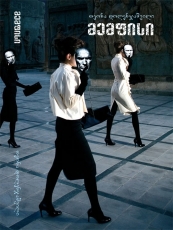MEMPHIS
In the novel, the events take their start in the Georgia of the 1990s and tell us about a painter girl from Tbilisi who is trying to escape abroad from the difficulties of her own country, as well as from her solitude and lack of love. In Europe, she becomes a famous painter, but can hardly find neither her peace, nor love. She returns to her home country, in order to find a donor for her sick child. Thus, she stumbles into an organisation which is profiting from homeless children’s organs. She finds herself confronted with the most important decision of her life, and at the same time, she cracks the mystery of her disappeared mother who had vanished without a single trace, while her daughter was still a child. In Memphis, the author tells about the contemporary crisis of the western world, and the role of the own country in the context of modern world: Is her country nothing but a donor, a still healthy transplant for old Europe, or does she have some other, more important mission?
EXTRACT
Translated into English by Elizabeth Heighway
CHAPTER 5
By then, the country was in the grip of a serious economic crisis, and public transport was so infrequent as to be effectively non-existent. Anyone who disliked waiting endlessly on an unlit pavement for a packed bus to come along, only to have to hang on like the last grape on the bunch, chose to walk instead. It wasn’t just me; almost everyone in the city chose to walk, heads bent forward, striding quickly along.
But the women I was watching seemed different from the other passers-by. There were six of them, and all six wore floor-length dresses and jet-black head-scarves.
I had just walked from Vake to Didube and was sitting on a bench outside the church. Suddenly six women filed out of the churchyard, one after the other, and floated slowly off like black-sailed ships, out into a street that throbbed with bustle and triviality. They were dressed like nuns – they probably were nuns – yet, when I saw them I was aware of a strange sensation inside me. Something about the women – the way they were dressed, their gait, the unusual length of their skirt tails, the sadness in their footsteps – reminded me of a scene from my not-too-distant past and of that blind visitor... In an instant, before my mind could even register what my body was doing, I leapt up and, almost without realising it, began to follow the procession of women, as if in a trance.
The women had nothing on their feet. As I watched them walk along, I caught sight several times of the whiteness of their bare soles flashing from beneath their long dresses. But although they were barefoot and on unpaved earth, they walked in a very orderly manner, never falling out of time with each other. It looked al-most as if they were floating across the surface of an invisible lake. They were like otherworldly dancers whose movements spontaneously determined the rhythm of some mystical music that nobody else could hear.
I did not really understand why I was following them, nor what I hoped to achieve by doing so, but I followed them anyway, as if under a spell, trying not to lose them in the fast-flowing stream of passers-by, and I became more and more con-vinced that these were indeed God’s handmaidens. There was something so strange, so mysterious, so dream-like in their appearance and in the way they moved... (See PDF)
In case of using the information, please, indicate the source.
